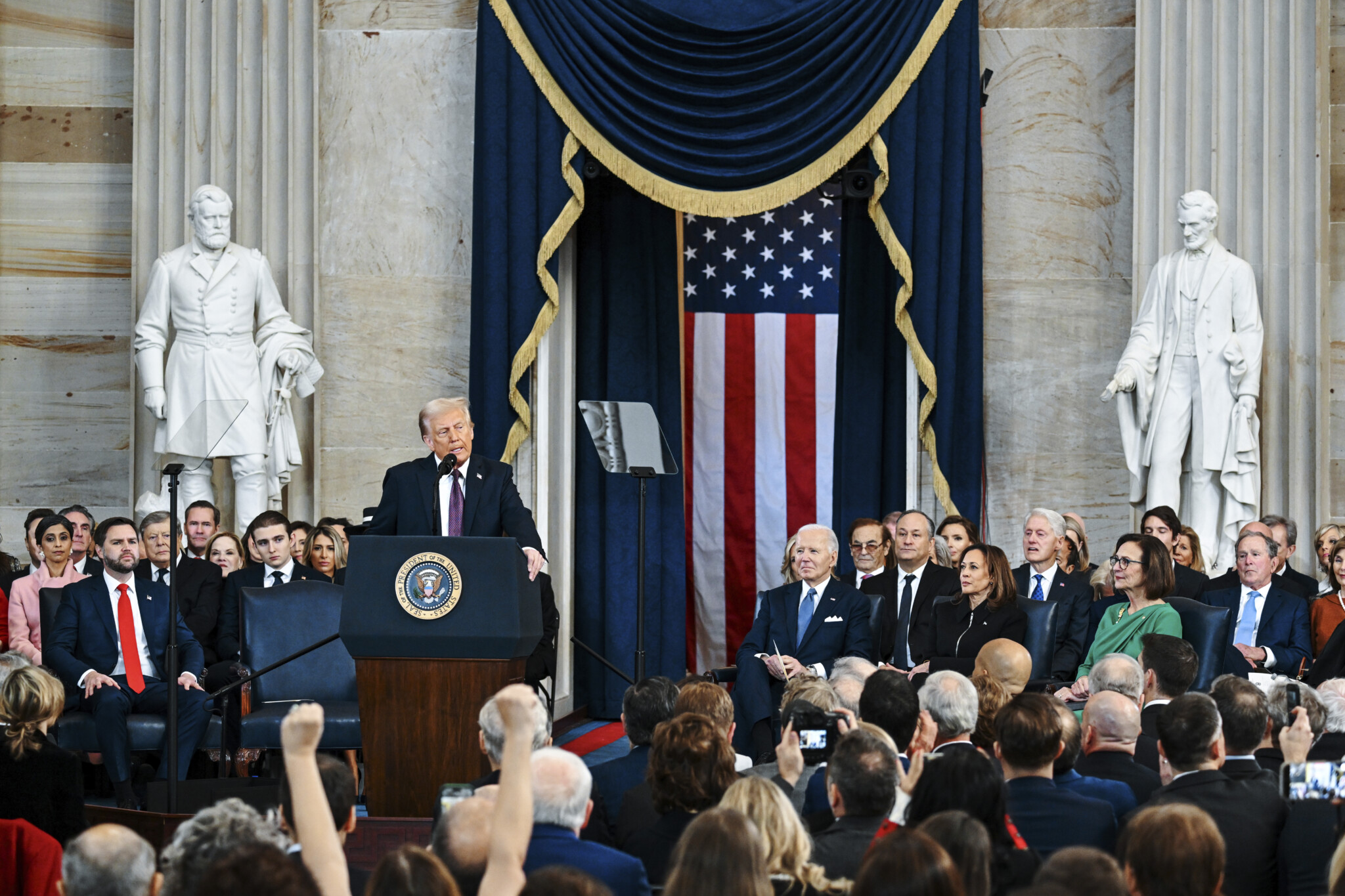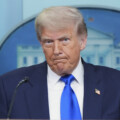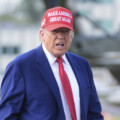With the onset of 25 percent tariffs on Canadian exports to the United States paused for (at least) 30 days, the suspense of tariffs and rumours of tariffs is temporarily muted. We are, however, on the verge of a brave new world rupturing a century of North American economic integration. There is a fundamental shift in the American approach to both Canada and the world.
The first observation is that in this new age, rivals are treated as friends while allies are treated as enemies. What else explains the proposed 25 percent tariffs on America’s closest ally but only 10 percent on its supposedly existential rival China?
The other observation is that these proposed tariffs did not emerge after deliberations of the democratically elected representatives of the American republic but from the edicts of President Donald Trump signed with the flourish of an absolute ruler. The republic has morphed into an empire under the imperial rule of Trump, who in a manner befitting Caesar Augustus has decreed that all the world should be taxed. And, for the time being, Americans seem to be of one mind, with the only question being who is using it. For now, it is Trump who, rather than speaking softly and carrying a big stick, is speaking loudly and slapping big tariffs with reckless abandon.
While one can try and rationalize what has transpired as a temporary aberration and hope reality will reassert itself, our national interest requires us to assume that this time really is different. What can Canada and indeed the rest of the world expect from the United States in this new imperial age? Despite the often-erratic discourse emanating from the White House on everything under the sun, suffice it to say that the themes shaping the foreign and domestic policy goals of our new emperor are fourfold: grievance, Manifest Destiny, mercantilism, and centralization.
Grievance
To start, the emperor feels aggrieved, both personally, in terms of the delays and challenges he faced on the road to fulfilling his presidential aspirations, and nationally in his role as the self-styled embodiment of America. America has been subsidizing the world with its defence spending, its funding and support of international rules and institutions that seemingly no longer benefit the United States, and with its rich consumer market that has become flooded with purveyors of foreign wares. Never mind that America’s defence establishment globally was put in place to contain threats before they reach North American shores, or that the post-Second World War international order including trade liberalization benefited American firms and consumers, or that American consumers like to buy cheap foreign goods.
However, the most grievous of the grievances is how America has been taken advantage of by those slyest of Machiavellian manipulators: Canada and Mexico. How a nation like Canada with a population barely one-tenth that of America is somehow the tail that wagged the North American dog is a question for another day. Yet, as legitimate as American concerns may be regarding our lacklustre defence spending, or our reluctance to open some of our more regulated markets, the punishment being imposed is not proportionate. Nevertheless, here we are.
The problem with grievance, whether in response to past national defeats, territorial losses, diminished status, or simply unrequited love, is that it becomes an emotional burden that clouds logic. A case in point: the emperor has decreed that since Canada has not adequately secured its border with the United States to prevent the outflow of migrants and fentanyl, it must be punished with tariffs. And yet, the odd thing here that no one seems to have picked up on, is that when it comes to borders, most countries have border officers and personnel to prevent people and unwanted things from getting in rather than stopping things from getting out.
True, there have been exceptions to this rule as some countries keep their citizens locked up and away from the rest of the world to prevent the contamination of foreign ideas and practices, but as serene, self-absorbed, and morally presumptuous Canadians are, Canada has never really been a hermit kingdom. If the Americans want to keep things out, then they also need to beef up their border. In this regard, might we perhaps want to offer the assistance of our defence establishment and loan them our troops to operate on their soil and help them secure their border? After all, they have their border officers in our airports.
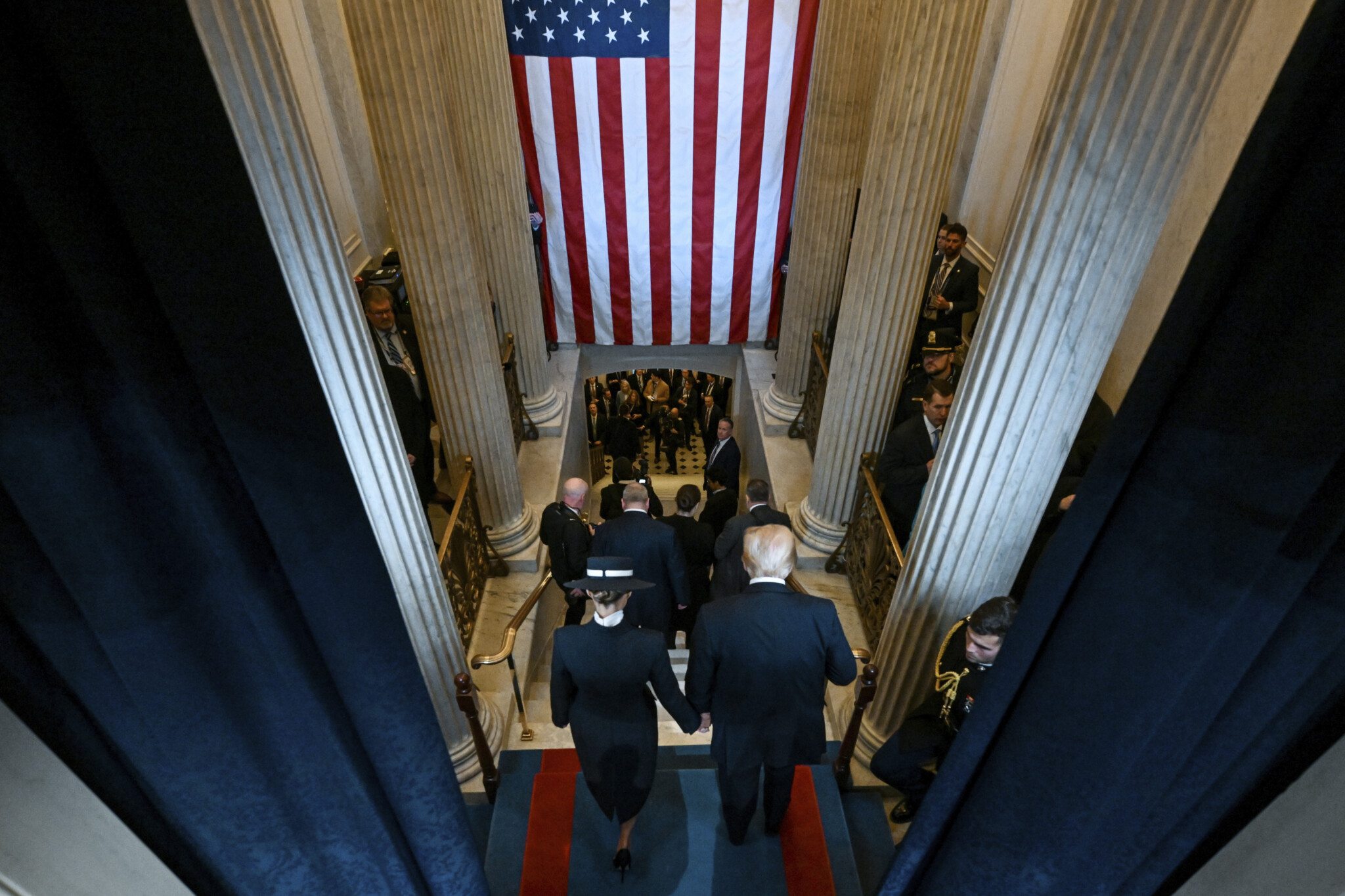
President Donald Trump, right, and first lady Melania Trump depart after the 60th Presidential Inauguration in the Rotunda of the U.S. Capitol in Washington, Monday, Jan. 20, 2025. Kenny Holston/The New York Times via AP, Pool.
Manifest Destiny
That the emperor wishes to annex Greenland or engage in Irredentism over Panamanian waterways is just the beginning. As every Canadian child once learned at school reading from textbooks like One Dominion, before curriculum czars replaced the knowledge of our national past and development with more oblique notions of community and cultural studies, the United States for much of its early destiny was expansionist. American civilization was destined to spread across North America, turn the Caribbean into an American lake, and put South America firmly in its embrace. When new lands could not be purchased—Louisiana or Alaska—they were taken by force—Mexico. This was Manifest Destiny, and combined with the Monroe Doctrine, this ensured that the Americas was an American Hemisphere.
Make no mistake, Trump is interested in territorial aggrandizement. Should Greenland be acquired by the United States, there will inevitably arise the desire to link Alaska with Greenland with Canada’s Arctic islands. Fortunately, Greenland is in Europe and the Europeans with their tortured history know a thing or two about dealing with border transgressions. However, despite his rhetoric, Trump almost surely does not want Canada to actually be the 51st state. Rather, by using “economic force,” the goal is to make Canada a more pliant and submissive vassal that would allow more unfettered access to its water, minerals, and energy.
America, and certainly Trump, does not want the responsibility of more citizens in the American fold. Rather, he would very much prefer us to be a federal territory with no voting rights in American elections but subject to American economic rules. A larger and snowier Puerto Rico. In such a brave new world, so much for Canadian premiers railing against Ottawa about intrusions into provincial jurisdictions. And for those Vichy Canadians who salivate at the prospect of transferring their wealth into American imperial dollars, the emperor will decree what the exchange rate will be at the time of Anschluss, and he will ensure it is the biggest wealth transfer to America in its history.
No doubt, Trump’s desire to create the Gazan Riviera is just the beginning.
Mercantilism
Emperor Trump would not be much out of place in the 19th century when tariffs were an industrialization strategy. Indeed, Trump is obviously a disciple of 19th-century German political economist Friedrich List, who was a critic of the liberal trade and economic policies of classical economists like Adam Smith. List advocated for “national” as opposed to “universal” trade policies whereby raw materials and agricultural products were to be imported with either low or zero tariffs. High tariffs were to be levied on manufactured goods, thereby promoting domestic manufacturing. Even Canada employed this approach with its National Policy tariffs and high rates on value-added imports.
However, List maintained that these policies were for nations under development rather than mature economies, and once countries had reached a high stage of manufacturing development, then trade competition would be beneficial. The fact that a highly developed economy like the United States is wielding the threat of high tariffs to promote domestic manufacturing suggests that Americans are unable to compete without the coercive crutch of a tariff.
Centralization
Finally, there is the theme of centralization of power both economic and political. The power of large oligopolies and monopolists in the United States has never been stronger as witnessed by their presence in places of honour at Trump’s inauguration. Then there is the centralization of power in the office of the president itself which has reached new heights in the first few weeks of the Trump presidency. The president is essentially ruling by decree signing swathes of executive orders. It is remarkable that a nation that was born as a revolt against taxation without representation and monarchial prerogatives is essentially being ruled by an elected monarch who to date has evaded the checks and balances that the Americans have traditionally prided themselves on as a restraint against tyranny. More to the point, making economic decisions by decree bodes poorly for the future of American decisions if executive orders rather than free markets and competitive economic interests are making resource allocation decisions.
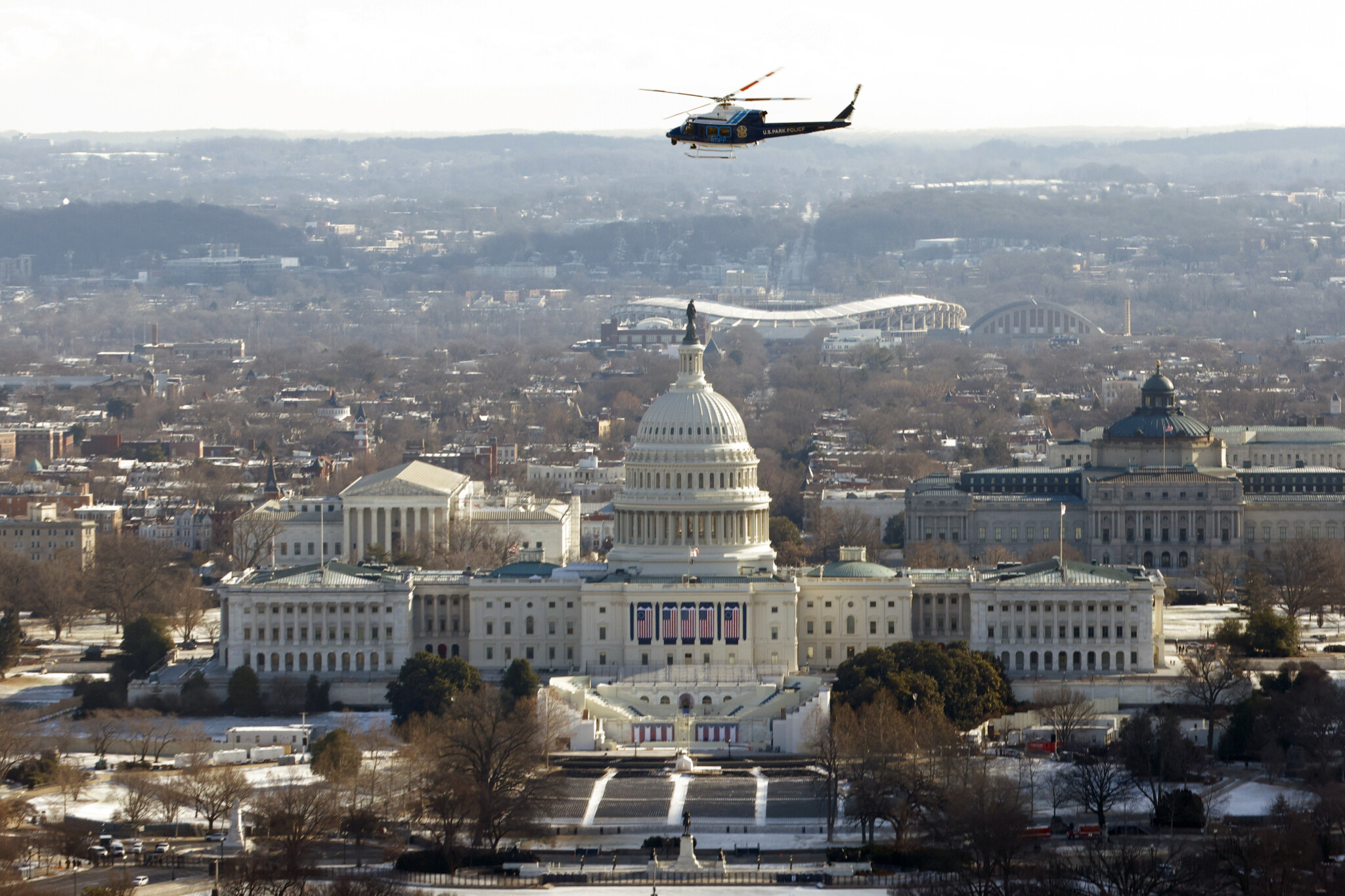
The U.S. Capitol is seen from the top of the Washington Monument at dawn on Inauguration Day, Monday, Jan.20, 2025 in Washington. Brendan McDermid/Pool Photo via AP.
How to respond
What is to be done in the face of heightened American grievance, expansionism, mercantilism, and power as concentrated in the imperial persona of Trump? Resorting to rational arguments regarding the mutually destructive economic effects of tariffs will be as effective as making rational arguments about the overall positive benefits of vaccines or fluoride. As most of us learned in elementary school—and Thunder Bay school grounds in the 1970s were exceptionally brutal places—if one is being bullied by someone much larger and stronger than you are, then you either must submit or give them the best shot you can and hope a bloody nose will make them think twice the next time.
This is not 1900 when Canada was a semi-industrialized nation of a few million largely rural dwellers scattered along a railway corridor. Canada is now a developed nation of over 40 million people, and this may be the best opportunity to make better use of our own internal market to boost productivity as well as find other international trading opportunities. It will not be pleasant or easy given the historic geographic convenience of the U.S. market. Indeed, this year will be harsh, but we really have no choice. Even if in the next 30 days the U.S. were to relent, why would we unquestioningly go back to things exactly the way they were with what has obviously become an erratic and unreliable trade partner? We have been complacent in relying on one market for 80 percent of our exports and perhaps this will be the catalyst to finally diversify into other markets.
It is unfortunate that we are entering this time of trial and uncertainty with a minority government facing a leadership race and on the verge of an election to boot. A coordinated national response under strong leadership does seem like the conventional way to deal with national issues and we are in a moment of weakness.
On the other hand, aside from tariffs and border controls, many of Canada’s economic levers ranging from direct government procurement for goods and services, crown corporations, as well as control over natural resources are in the hands of the provinces. It is part of the magic of Canadian federalism—a coordinated response if necessary but not necessarily coordinated. There are ten premiers but only one American president. Perhaps a disjointed response where everyone is doing their own thing providing the Americans with a whack-a-mole experience of responses is just what the emperor needs. Despite the 30-day pause, the premiers and the federal government cannot relent in their efforts to advance Canada’s economic interests.
